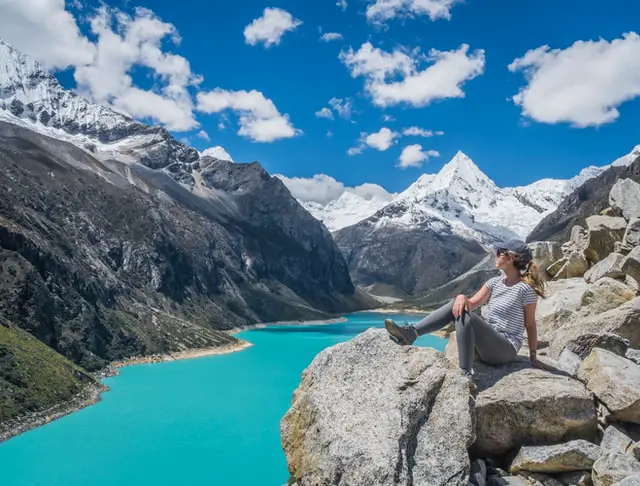Have you ever dreamed of exploring untouched rainforests, snorkeling in crystal-clear waters, or witnessing wildlife in its natural habitat—without harming the planet? Ecotourism isn’t just about travel; it’s a movement toward responsible exploration that protects the environment and uplifts local communities.
But who exactly is fueling this shift toward sustainable travel? Understanding the target market for ecotourism is key to shaping unforgettable experiences while preserving the world’s natural beauty. Whether you’re a travel business looking to attract eco-conscious tourists or a curious traveler wondering if ecotourism aligns with your values, this guide will break down who these adventurers are and what drives them.
Keep reading to discover the different types of ecotourists, their motivations, and how businesses can cater to this growing market!
Understanding Ecotourism & Its Appeal

Ecotourism is more than just a travel trend—it’s a response to growing environmental concerns and a shift in consumer values. As more travelers seek meaningful and sustainable experiences, businesses in the tourism industry must understand what makes ecotourism so appealing.
What is Ecotourism?
Ecotourism is a form of travel that focuses on environmental conservation, cultural preservation, and responsible tourism practices. Unlike mass tourism, which often leads to environmental degradation and cultural exploitation, ecotourism aims to minimize negative impacts while promoting positive contributions to local communities.
According to the Global Ecotourism Network, true ecotourism involves:
- Traveling to natural areas that support conservation efforts
- Educating travelers about the environment and local cultures
- Providing financial benefits to conservation initiatives and local communities
- Reducing carbon footprints through sustainable travel choices
Why Ecotourism is Growing in Popularity
The demand for ecotourism is rising as travelers become more conscious of their environmental impact. A 2023 Sustainable Travel Report by Booking.com found that 76% of global travelers want to make more sustainable travel choices, and nearly 40% are willing to pay extra for eco-friendly accommodations.
Several factors are driving this shift:
- Climate Change Awareness – More travelers are recognizing the impact of traditional tourism on the planet and are seeking alternatives that align with sustainability goals.
- Experiential Travel Trends – Consumers, especially younger generations, prioritize experiences over material goods. Ecotourism offers unique, immersive, and meaningful travel experiences.
- Government & Industry Support – Many countries are introducing policies and incentives to promote responsible tourism, making ecotourism more accessible.
The Economic & Social Benefits of Ecotourism
Beyond environmental sustainability, ecotourism provides significant economic and social advantages:
- Boosting Local Economies – Unlike large-scale tourism, which often benefits multinational corporations, ecotourism directs revenue toward local businesses, artisans, and tour guides.
- Cultural Exchange & Preservation – Responsible ecotourism encourages respect for indigenous cultures and helps preserve traditional knowledge and customs.
- Job Creation – Sustainable tourism initiatives create employment opportunities in conservation, hospitality, and eco-tour operations, reducing reliance on industries that harm the environment.
Understanding these factors is crucial for businesses aiming to attract the growing market of eco-conscious travelers. The next section will break down who the key target audiences are and what motivates them to choose ecotourism over conventional travel options.
Who is the Target Market for Ecotourism?
Understanding the key demographics and psychographics of ecotourists is essential for businesses looking to attract and serve this growing market. Ecotourists are not a monolithic group—they come from diverse backgrounds, but they share common values: sustainability, cultural appreciation, and a love for nature.
Nature Enthusiasts & Adventure Travelers
This segment includes individuals who seek outdoor experiences and prioritize exploring natural landscapes. They are drawn to national parks, wildlife reserves, and remote destinations that offer activities like hiking, scuba diving, and safari tours.
- Motivations: Seeking excitement, connection with nature, and physical challenges.
- What Attracts Them: Well-preserved natural areas, biodiversity, and adventure-based experiences such as rainforest treks or mountain expeditions.
- Business Opportunity: Offering guided eco-tours, responsible wildlife encounters, and conservation-focused activities.
Example: Costa Rica, a leading ecotourism destination, attracts adventure travelers with its extensive national parks, zip-lining through rainforests, and marine conservation diving programs.
Environmentally Conscious Travelers
This group consists of eco-conscious consumers who actively seek ways to reduce their carbon footprint. They prioritize accommodations, transportation, and activities that align with their sustainability values.
- Motivations: Minimizing environmental impact, supporting conservation efforts, and ethical consumerism.
- What Attracts Them: Carbon-neutral accommodations, renewable energy use, sustainable food sourcing, and responsible tourism certifications.
- Business Opportunity: Investing in green certifications, promoting zero-waste initiatives, and offering low-impact travel options.
Example: Eco-lodges in the Galápagos Islands implement solar power, water conservation, and eco-friendly waste management to appeal to this audience.
Millennials & Gen Z Travelers
Younger generations are at the forefront of the sustainable travel movement. They seek unique, experience-driven trips and are highly influenced by social media and online reviews.
- Motivations: Experiencing new cultures, personal growth, and sharing meaningful travel experiences online.
- What Attracts Them: Instagram-worthy eco-destinations, voluntourism opportunities, and community-driven tourism.
- Business Opportunity: Leveraging digital marketing, partnering with sustainable travel influencers, and offering interactive experiences like eco-workshops.
Example: Bali’s Green Village, built from sustainable bamboo, attracts young travelers looking for immersive, photogenic, and environmentally responsible accommodations.
Families Seeking Educational Experiences
Parents are increasingly looking for family-friendly travel that educates children about sustainability and nature conservation. These travelers want interactive and engaging experiences that go beyond traditional sightseeing.
- Motivations: Providing meaningful learning opportunities for children while enjoying a vacation.
- What Attracts Them: Hands-on conservation activities, eco-friendly resorts with family programs, and wildlife encounters in ethical settings.
- Business Opportunity: Developing child-friendly ecotourism packages, offering guided educational tours, and partnering with schools and youth organizations.
Example: South Africa’s Shamwari Private Game Reserve offers an interactive kids’ program, teaching wildlife conservation in a fun, engaging way.
Luxury & Wellness Travelers
Contrary to common misconceptions, ecotourism is not limited to budget-conscious travelers. The luxury travel market is increasingly embracing sustainability, offering high-end experiences that align with eco-conscious values.
- Motivations: Seeking relaxation, wellness, and exclusivity while supporting sustainability efforts.
- What Attracts Them: Eco-luxury resorts, holistic wellness retreats, and private nature experiences.
- Business Opportunity: Creating high-end sustainable accommodations, offering eco-friendly spa treatments, and integrating organic farm-to-table dining.
Example: Six Senses Hotels and Resorts, a global luxury brand, is renowned for combining five-star experiences with sustainability initiatives, such as organic gardens and conservation programs.
Identifying and catering to these diverse target groups allows businesses to tailor their offerings and marketing strategies effectively. In the next section, we’ll explore how to attract and engage ecotourists by aligning business practices with their values.
How to Attract and Engage Ecotourists

To successfully capture the growing ecotourism market, businesses must align their offerings with the values and expectations of eco-conscious travelers. This involves sustainable practices, authentic experiences, and strategic marketing that resonates with the target audience.
Implement Sustainable Business Practices
Ecotourists actively seek businesses that demonstrate a genuine commitment to sustainability. Adopting eco-friendly practices not only attracts conscious travelers but also enhances brand reputation and long-term profitability.
- Eco-Certifications & Standards – Obtaining recognized certifications such as Green Key, EarthCheck, or Global Sustainable Tourism Council (GSTC) certification reassures travelers of your commitment to sustainability.
- Sustainable Infrastructure – Invest in renewable energy, water conservation systems, and eco-friendly building materials to reduce environmental impact.
- Waste Reduction & Recycling – Implement plastic-free policies, composting programs, and encourage guests to participate in sustainability efforts.
Example: Soneva Resorts in the Maldives uses solar power, bans single-use plastics, and operates its own glass recycling plant, setting a benchmark for sustainable hospitality.
Offer Authentic & Immersive Experiences
Ecotourists prioritize experiences that provide deep connections to nature, culture, and conservation efforts. Businesses must move beyond traditional sightseeing and create engaging, hands-on opportunities.
- Wildlife & Nature Conservation Activities – Offer guided eco-tours, reforestation projects, or ethical wildlife encounters that support conservation efforts.
- Cultural Exchange Programs – Partner with local communities to provide authentic cultural experiences, such as traditional crafts, indigenous storytelling, or farm-to-table cooking classes.
- Adventure & Wellness Integration – Combine sustainability with adventure tourism (hiking, kayaking, diving) or wellness tourism (eco-friendly retreats, yoga in nature).
Example: The Great Bear Rainforest in Canada offers eco-tours that allow visitors to observe wildlife in their natural habitat while supporting Indigenous-led conservation initiatives.
Leverage Digital Marketing & Storytelling
Effective marketing is essential to reaching ecotourists. Consumers trust brands that communicate their sustainability efforts transparently and authentically.
- Content Marketing & Social Media – Share engaging stories about conservation efforts, eco-friendly initiatives, and visitor experiences through blogs, videos, and social media campaigns.
- Influencer & Partner Collaborations – Work with sustainable travel influencers, NGOs, and travel platforms to boost credibility and visibility.
- SEO & Online Visibility – Optimize websites with keywords like “sustainable travel,” “eco-lodges,” and “responsible tourism” to attract search traffic from eco-conscious travelers.
Example: Costa Rica Tourism Board uses immersive storytelling, highlighting conservation projects and community involvement to position the country as a top ecotourism destination.
Provide Meaningful Community Engagement
A crucial aspect of ecotourism is ensuring that local communities benefit economically and culturally from tourism. Businesses should integrate ethical tourism practices that empower communities.
- Employ & Train Locals – Prioritize hiring from local communities and provide skill development programs.
- Support Local Businesses – Source food, crafts, and services from local artisans and farmers to keep tourism revenue within the community.
- Create Ethical Volunteer Opportunities – Offer voluntourism experiences that contribute to conservation or community development without exploiting local resources.
Example: G Adventures’ “Ripple Score” measures how much of a tour’s revenue stays within the local economy, helping travelers choose ethical and community-supportive experiences.
Future Trends in Ecotourism and Market Evolution
As the demand for sustainable travel grows, businesses in the ecotourism sector must stay ahead of emerging trends. Understanding these shifts can help organizations adapt their offerings, attract conscious travelers, and maintain a competitive edge.
Tech-Driven Sustainable Tourism
Innovation is reshaping ecotourism, with technology playing a crucial role in reducing environmental impact and enhancing guest experiences.
- Smart Eco-Lodging – Hotels and resorts are integrating smart energy systems, AI-driven waste management, and water-saving technologies to minimize resource consumption.
- Virtual & Augmented Reality (VR/AR) Experiences – Some eco-destinations offer virtual conservation tours and immersive AR experiences to educate travelers about wildlife and sustainability before they visit.
- Carbon Tracking Apps – Travelers now use apps like Earth Hero and GreenTraveler to monitor and reduce their carbon footprint while planning eco-friendly trips.
Example: The Svart Hotel in Norway, set to open in 2024, will be the world’s first energy-positive hotel, using solar technology to generate more energy than it consumes.
Rise of Regenerative Tourism
While sustainability aims to minimize harm, regenerative tourism goes a step further by actively restoring and improving destinations.
- Community-Led Initiatives – More travelers are seeking experiences where they contribute to local development, conservation, or cultural preservation.
- Rewilding & Ecosystem Restoration – Ecotourism businesses are integrating habitat restoration projects, such as tree-planting and wetland conservation, into their offerings.
- Circular Economy Practices – Businesses are shifting toward zero-waste tourism models, using locally sourced materials, upcycled infrastructure, and closed-loop supply chains.
Example: New Zealand’s Tiaki Promise encourages visitors to act as guardians of the land, promoting conservation and responsible travel behavior.
Growing Demand for Carbon-Neutral Travel
As climate change concerns rise, travelers are prioritizing low-carbon and carbon-neutral travel options. Businesses must align with this shift to stay relevant.
- Eco-Friendly Transportation – Growth in electric vehicle (EV) rentals, solar-powered boats, and biofuel-powered flights is making eco-travel more accessible.
- Carbon Offset Programs – Many travel companies, such as Intrepid Travel and National Geographic Expeditions, allow customers to offset their carbon footprint by funding environmental projects.
- Slow & Localized Travel – More travelers are embracing “slow travel”, favoring longer stays and deeper cultural immersion to reduce excessive transportation emissions.
Example: France’s ban on short-haul domestic flights (where train alternatives exist) reflects a global push toward sustainable travel policies.
Authenticity & Ethical Tourism as Key Differentiators
Consumers are becoming more discerning, demanding genuine sustainability efforts rather than token gestures of eco-friendliness.
- Transparent Sustainability Reporting – Travelers expect businesses to publish measurable sustainability goals, impact reports, and third-party audits to validate their claims.
- Ethical Wildlife Tourism – The rise of animal-friendly tourism practices is shifting demand away from activities like elephant riding toward ethical sanctuaries and conservation-based interactions.
- Indigenous-Led Travel Experiences – There is growing recognition of Indigenous communities as key stewards of the land, with travelers seeking authentic cultural experiences led by local experts.
Example: Australia’s “Welcome to Country” platform connects travelers with Aboriginal-led tourism experiences, ensuring direct benefits to Indigenous communities.
Conclusion
The ecotourism market is evolving rapidly, driven by shifting consumer values and a growing commitment to sustainable travel. Businesses that understand their target audience—ranging from environmentally conscious millennials to luxury eco-travelers—will be better positioned to attract and retain customers.
Key trends, such as tech-driven sustainability, regenerative tourism, and carbon-neutral travel, highlight the increasing demand for experiences that go beyond traditional eco-friendly offerings. To remain competitive, businesses must embrace transparency, prioritize ethical practices, and innovate with sustainable solutions that align with travelers’ expectations.
For those looking to succeed in the ecotourism sector, the path forward is clear: listen to your audience, invest in sustainable initiatives, and create meaningful experiences that foster a deeper connection between travelers and the natural world. By doing so, businesses can not only thrive but also contribute to a more sustainable and responsible future for tourism.


